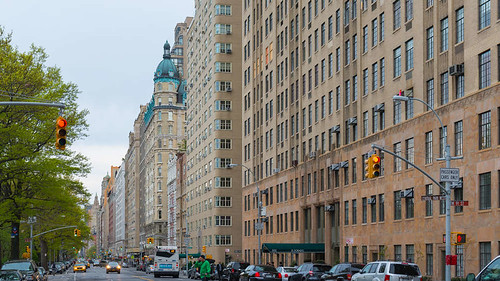Protest poster on DC zoning ruling

The whole argument about planning in DC and the Comprehensive Plan is somewhat complicated.
I argued that before doing the zoning rewrite (2007-present), after the Comp Plan was approved in 2006, there should have been a couple years of "road show" around the city to build a consensus around what the plan "means."
People like me who are pragmatic, committed to identity and aesthetics, but still support judicious development can read the same paragraphs and have a completely different understanding of what it means from the people who are "against development."
This poster is referring to a court decision handed down last month, concerning the development of "McMillan Park," land that had been used by the water treatment system in the city, but was deaccessioned when the methods of water treatment changed ("D.C. court allows McMillan project to proceed," Washington Business Journal).
The site is across from the Washington Hospital Center at Michigan Avenue and North Capitol Street NW, and is a couple blocks in size. It is "encumbered" by the silos and underground caverns once used to filter water.

Most of the people "against" its development want it to be used as park space. DC has tons of park space, much of it poorly utilized. This site would be no better as it is poorly situated.
Pro-park yard sign.
When the city purchased the land in 1987, rather than get it for free in return for committing to using it as a park, they paid for it.
While the land is designated historic and requires historic review, I argued with the opponents of development, making the point that just because something is designated as historic, it doesn't mean that it can't be developed. They argued the opposite.
Anyway, in my opinion the city mishandled the proposed development of the site. They issued an RFP for planning, and then awarded the site to one of the respondents.
But a thorough robust plan was never created. IMO anyway, although there is a development program for the site ("A Reimagining in Washington Divides the Neighbors," New York Times).

Rendering of the redevelopment program, Vision McMillan Partners.
It's one of many examples of my line that "an RFP isn't a plan."
It would have been better to develop a community consensus plan and then seek developers.
But even then, likely people would have been opposed to development, because most people are.
You can make reasonable arguments to keep it as a park, except for the fact that it would be lightly used.
My mentor argues rightly that I am wrong, that if the site were to be surrounded by high rise high quality apartment buildings, like Central Park or Bryant Park in New York City, it would make perfect sense.

High rent apartment buildings line Central Park West, across from Central Park in Manhattan.
It would in a theoretical world, but we aren't in such. The fact is that it can't really be developed that way on two sides, because of the Washington Hospital Center being on one side and the extant McMillan Reservoir on another -- unless you developed the interior edge of the site.
And the other two sides are occupied by rowhouses and likely the owners wouldn't willingly sell their properties for redevelopment, let alone on one side the block is truncated -- not very deep -- because it abuts a cemetery.
So in short, there isn't the kind of development capacity necessary to make that work.
Not to mention that the proponents of the park idea would never countenance that kind of change. Like I said to her, "they'd slit your throat if you ever expressed that concept in a public meeting."
====
Separately, the Office of Planning is pursuing a Comprehensive Plan rewrite, which is controversial. The office held a amendment rewrite cycle and then afterwards announced that instead they were revising the plan, but with no additional public meetings. They then submitted the rewrite of the Framework Element to the City Council, which held a marathon hearing for the only chance at public input.
Because of the outcry, they didn't move the changes forward, in that Council round. But they have taken it up again, also with very limited public input ("D.C. Council Approves Comprehensive Plan Amendments, But Planning Director Concerned With Some Changes," Bisnow).
(The mishandling of the process ended up costing the job of the now former director of the Office of Planning.)
I agree with the "opponents of development" that this revision process is flawed, and reasonably undemocratic. I don't agree though with a lot of their criticisms about changes.
The problem with the Comp Plan is that the writers wanted to "have their cake and eat it too." They under-defined many elements concerning density etc., making it easy to fight virtually any proposal, and providing too hazy guidance to the Courts, when and if approved projects were challenged.
Many of the changes to the Framework Element address this.
But even if I agree with the changes and believe they are necessary, the process is flawed, and they should go back and do a public process.
Again, not building consensus about what the plan even means leads to these kinds of problems.
Labels: building regulation, comprehensive planning/Master Planning, Growth Machine, real estate development, urban design/placemaking, urban planning, urban revitalization, zoning




0 Comments:
Post a Comment
<< Home